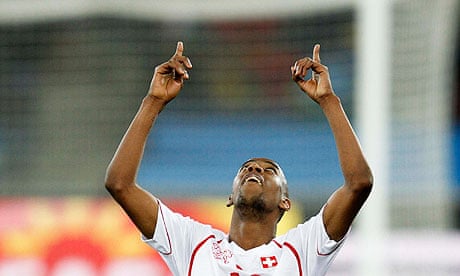The World Cup has its first shock and, as unexpected results go, it could be that this tournament sees nothing quite so remarkable again. Spain may be sublime on the ball yet the lesson handed out by a limited but ultimately jubilant Swiss side is that there is no use out-passing, out-manoeuvring and out-classing opponents without out-scoring them.
• Follow the Guardian's World Cup team on Twitter
• Sign up to play our great Fantasy Football game
• Stats centre: Get the lowdown on every player
• The latest team-by-team news, features and more
Switzerland have now equalled Italy's record of five successive clean sheets in the World Cup but, of greater importance to the tournament as a whole, they have brought the competition a sense of drama courtesy of some parsimonious defending and the decisive contribution of Gelson Fernandes, once an unremarkable fringe player at Manchester City thrust into the role of an improbable hero.
The most illuminating moment of Fernandes's career came 52 minutes into a match that will be remembered for Spain's domination as well as their frustration. Vicente del Bosque's players oozed sophistication and authority but somehow, almost bewilderingly, they lost the game and in the process theyfind themselves clutching the wooden spoon in Group H.
As they survey the damage, they have legitimate reason to fear they are going to live up to their reputation as serial World Cup underachievers.
In all likelihood these players are accomplished enough to dust themselves down and clamber safely into the knockout phase, something borne out by the fact that even in defeat they had two-thirds of the possession. The Euro 2008 winners moved the ball beautifully, working those elaborate, triangular patterns, always looking for the killer ball.
But this was pass-them-to-death football without any end product and, unless they remedy that, maybe this will come to be remembered as a devastating blow. No team has ever won the World Cup after losing its first match.
Ottmar Hitzfeld, the Switzerland manager, admitted it had been "three very unexpected points", and there was no sense of exaggeration given that Spain had won 33 of their previous 34 competitive matches and came into this competition as the joint favourites alongside Brazil. The best way, perhaps, to sum up the awesome strength of this Spanish squad is to look at the category-A footballers who did not even start this match – a list that includes Pepe Reina, Cesc Fábregas and Fernando Torres, quite possibly the best goalkeeper, midfielder and striker in England last season.
In terms of keeping the ball Spain were by far the more graceful side, racking up 271 passes inside the opening half-hour – or to put it another way, the average amount that Stoke City managed in a full Premier League match last season. But Switzerland defended stoutly, rolled up their sleeves, had a bit of luck and their goalkeeper, Diego Benaglio, had one of those games when someone could have thrown a piggybank's worth of loose change at him and he would have caught every coin.
Even so it was bewildering that Spain should lose considering the balance of play and, even more so, that Switzerland came so close to scoring a second when Eren Derdiyok made room for himself inside the penalty area and prodded a shot against the post after 75 minutes.
Otherwise the action was almost exclusively in the Swiss half of the pitch. Xabi Alonso rocketed a shot against the crossbar. Benaglio kept out Andrés Iniesta and saved at the feet of David Villa.
Torres emerged to great acclaim from the crowd but the Liverpool striker was maybe too eager to make an impact and, at times, looked uncharacteristically careless – a legacy, perhaps, of his two months out of action with an ankle injury.
The one downside for Switzerland was the ankle injury that forced off Philippe Senderos inside the first half and may have ended his tournament if a scan shows that Fulham's recent signing from Arsenal has damaged ligaments. Senderos may have his critics in England but he is an important figure in the Swiss defence and it is to their credit that his departure did not adversely affect their defensive organisation.
Their opponents, in comparison, will shudder when they see the replays of Fernandes's winner and, in particular, the ease with which they allowed Derdiyok through on goal during the build-up. Iker Casillas was quick off his line but the ball fell for Fernandes and the midfielder applied the finishing touch, despite the centre-half Gerard Piqué's desperate attempt to clear the danger.
Back came Spain, not veering from their patient, probing approach. The Swiss goal led a charmed life but Fernandes's score had given Hitzfeld's players a great incentive to withstand the increased pressure, including five minutes of stoppage time, before the referee Howard Webb's final shrill of the whistle.
For Spain it is difficult to know how their World Cup could have started more gallingly. The fact that their discomfort has invigorated a hitherto disappointing competition will be no consolation.
